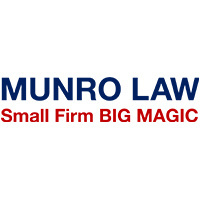 Harrisonburg City County, VA Credit & Debt Lawyers
Harrisonburg City County, VA Credit & Debt Lawyers
Not enough matches for Harrisonburg City Credit & Debt lawyer.
Below are all Harrisonburg City lawyers.
Sponsored Lawyers
1-10 of 71 matches
Criminal
Criminal Defense & Child Custody are complex cases and require strong effective representation. Munro Law Firm stands ready for you with free consults in criminal cases and a modest fee for Child Custody cases. Small Firm - BIG MAGIC! Call Now & Let's Talk about what we can do for you. Friendly Attorney - No Obligation - No Risk
(more)




